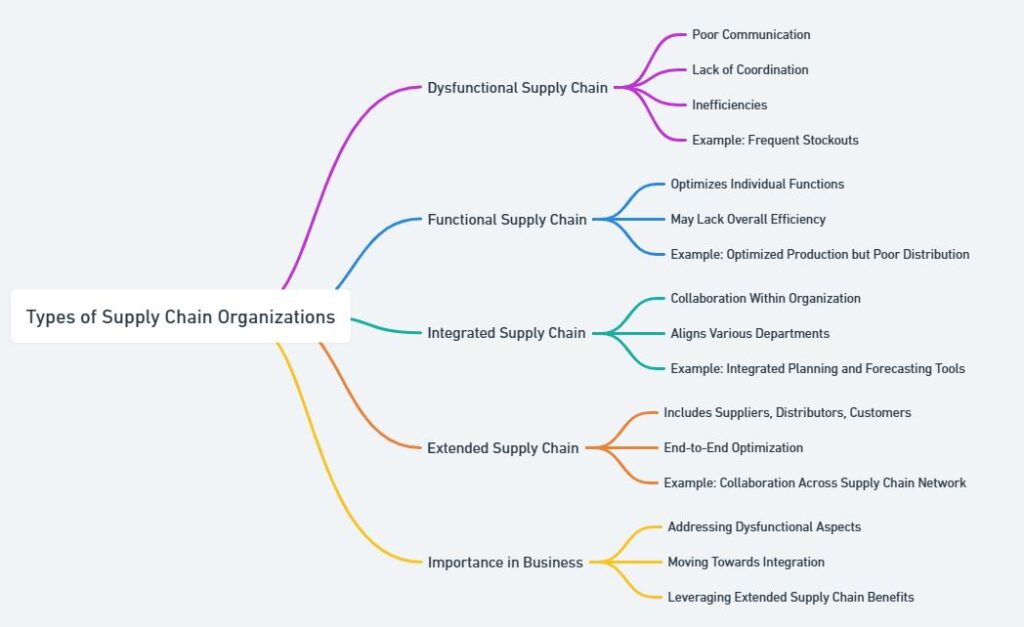
Supply chain management is a critical aspect of modern business operations, encompassing the flow of goods, information, and finances from the point of origin to the end consumer. The effectiveness of a supply chain can significantly impact a company’s success. There are various types of supply chain organizations, each with its characteristics and levels of integration. Understanding these types is crucial for businesses to optimize their supply chain strategies.
Types of Supply Chain Organizations
- Dysfunctional Supply Chain:
- A dysfunctional supply chain is characterized by poor communication, lack of coordination, and inefficiencies. It often results in delays, increased costs, and reduced customer satisfaction.
- Example: A company that experiences frequent stockouts due to poor demand forecasting and inadequate communication with suppliers.
- Functional Supply Chain:
- A functional supply chain focuses on optimizing individual functions or departments within the organization, such as procurement, manufacturing, or distribution. While it may improve efficiency within specific areas, it may not optimize the entire supply chain.
- Example: A manufacturer that has optimized its production process but faces challenges in distribution due to lack of integration with logistics partners.
- Integrated Supply Chain:
- An integrated supply chain involves a higher level of collaboration and coordination among different functions within the organization. It aims to align various departments to achieve overall supply chain efficiency.
- Example: A retailer that uses integrated planning and forecasting tools to align its procurement, warehousing, and sales strategies.
- Extended Supply Chain:
- An extended supply chain goes beyond the organization to include suppliers, distributors, and customers. It focuses on end-to-end optimization and collaboration across the entire supply chain network.
- Example: An automotive company that works closely with its suppliers and dealers to streamline production, inventory management, and distribution.
Importance of Supply Chain Organization Types
- Dysfunctional Supply Chain: Understanding and addressing the issues in a dysfunctional supply chain is crucial for preventing operational disruptions and financial losses.
- Functional Supply Chain: While functional supply chains can improve specific areas, businesses need to consider the broader impact on the overall supply chain.
- Integrated Supply Chain: Integrated supply chains can lead to improved efficiency, reduced costs, and better responsiveness to market changes.
- Extended Supply Chain: Extended supply chains offer the highest level of optimization, enabling businesses to leverage the strengths of their partners and enhance competitiveness.
Practical Examples
- Dysfunctional Supply Chain:
- A clothing retailer experiences frequent overstock and stockout situations due to poor coordination between its purchasing and sales departments.
- Functional Supply Chain:
- A food processing company has an efficient manufacturing process but struggles with late deliveries due to a lack of integration with its transportation providers.
- Integrated Supply Chain:
- An electronics manufacturer uses real-time data sharing and collaborative planning with its internal departments to streamline production and reduce lead times.
- Extended Supply Chain:
- A multinational consumer goods company collaborates with suppliers, logistics providers, and retailers to optimize its global supply chain, resulting in cost savings and improved market responsiveness.
In conclusion, the type of supply chain organization a company adopts can significantly impact its efficiency, cost-effectiveness, and ability to meet customer demands. While dysfunctional supply chains can hinder business success, functional, integrated, and extended supply chains offer varying degrees of optimization and collaboration. Businesses should strive to move towards more integrated and extended supply chain models to remain competitive in today’s dynamic market environment.

